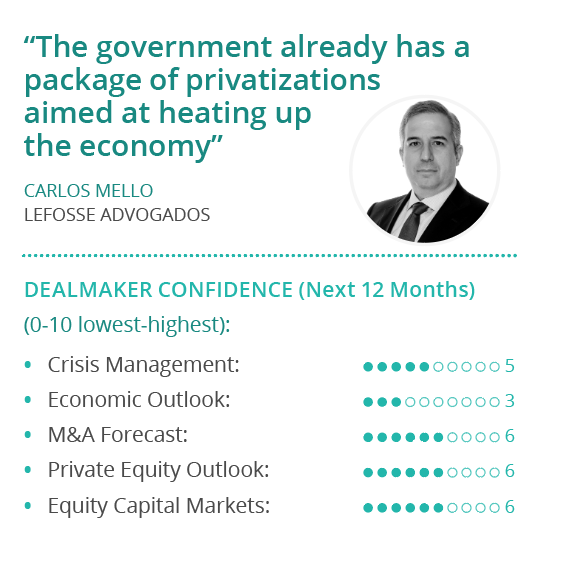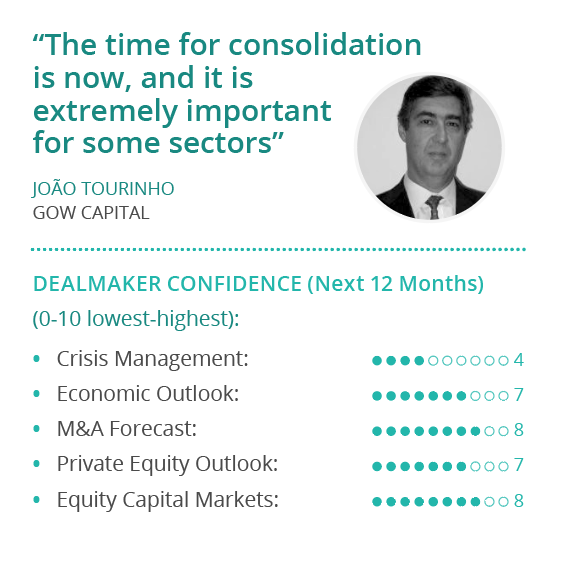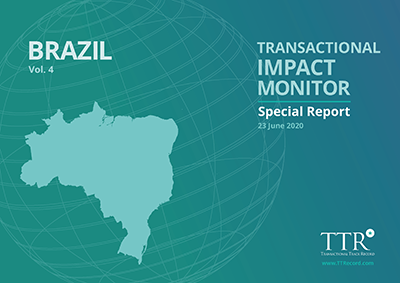Transactional Impact Monitor: Brazil – Vol. 4
23 June 2020
TTR’s Transactional Impact Monitor (TIM) is a Special Report combining local knowledge and market visibility from top dealmakers developed to address extraordinary situations affecting the macroeconomic stability and M&A outlook in core markets
INDEX
– M&A Outlook
– Private Equity
– Capital Markets
– Handling the Crisis
– Dealmaker Profiles
Three months after Brazil began to implement its patchwork response to the SARS-CoV-2 threat, dealmakers report widely varying levels of confidence in the strength of an economic recovery as the first half of 2020 draws to a close.
Despite the monumental level of public spending, Brazil has not yet been able to control the spread of SARS-CoV-2 and the death toll continues to mount, noted Lefosse Advogados Partner Carlos Mello.

It’s been three months since Brazilians were encouraged to self-quarantine, some under more strict guidelines than others, depending on the measures deemed appropriate by state governors, who took the health threat more or less seriously, depending on their individual assessment of the risk and their political alignment with President Jair Bolsonaro.
The authorities allowed many non-essential businesses to continue operating, including industrial production in São Paulo, Mello noted, which could have contributed to a delay in the number of reported Covid-19 cases tapering off.
Social distancing guidelines could be in effect in Brazil until September, and that will naturally create difficulties for the Brazilian market, said Mello, noting the real economy will suffer for a long time.
We are still in uncharted territory, noted veteran investor and CIO of GOW Capital, João Tourinho, but Brazil is well positioned for a quick rebound thanks to the private savings accumulated over the past four years, that were channeled to corporates seeking capital, whether via the debt or equity capital markets. These savings, he said, have provided unprecedented levels of liquidity to the market, while financial technology has served as an efficient vector, making funding readily available and affordable to credit worthy enterprises. Combined, these factors represent a disruptive force, transforming the way business is carried out in Brazil, Tourinho said.
There is a clear split between the performance of companies that meet the basic needs of society, on the one hand, and those whose products fall under discretionary spending, according to Vinci Partners Head of Financial Advisory Felipe Bittencourt. Consolidation is very likely in those sectors suffering the most, including tourism, aviation, the auto industry, manufacturing and education, Bittencourt said.

Sectors that continue to perform well, meanwhile, include healthcare, services, food, cleaning products, e-commerce and agriculture, Bittencourt said. Deals in these sectors have been proceeding with minimal disruption, he noted.
Vinci closed two transactions following the mid-March lockdown in Brazil, with a third deal reaching an exclusive phase, he said. In the first deal, Vinci was advising a seller of a financial services company, and there was no need to renegotiate terms, he said. In the second deal, Vinci was advising the buyer and the deal value was renegotiated, he added. In the transaction pending close, Vinci is advising the seller in the sale of a construction materials company to a strategic buyer based in the EU. The seller has a specific use in mind for the cash and will exit the business completely, otherwise it wouldn’t have been a good time to sell, he said.
“As advisors we take a conservative approach, we do a lot of technical analysis,” Bittencourt said. “In a period like this, you run different scenarios, the negotiations take a long time.” For those sectors that are suffering, more analysis is required as there’s more risk involved in an acquisition, especially on the buy side, he said. Vinci has other deals underway in the healthcare space, financial services, cleaning products, tourism, automotive and manufacturing, he noted.
Vinci is fielding calls related to new deal origination that can be split into two groups, Bittencourt said. On the one hand, local companies are studying partnerships, acquisitions and mergers to gain efficiencies and resolve capital structure weaknesses, he said. The economic fallout from measures imposed to mitigate the SARS-CoV-2 threat has accelerated these types of discussions, he said.

On the other hand, Vinci is fielding interest from international investors that have been looking at opportunities in Brazil for a long time and consider the currency depreciation advantageous, he said. “They believe it’s a good time to buy assets here for a decent price,” he said, noting those initiatives represented a confluence of the long-term view of these international investors and a situational opportunity.
All the firm’s non-strategic mandates with international financial sponsors, on the other hand, have been put on ice, he said. “They’ve frozen their operations in Brazil.”
Local private equity players, including Vinci’s own fund manager, remain active, however, he said. Local funds have been looking at opportunistic acquisitions while reviewing their own portfolios throughout the crisis, he said.
M&A Outlook
… Click here to access the fourth issue of Transactional Impact Monitor: Brazil – Vol. 4.

